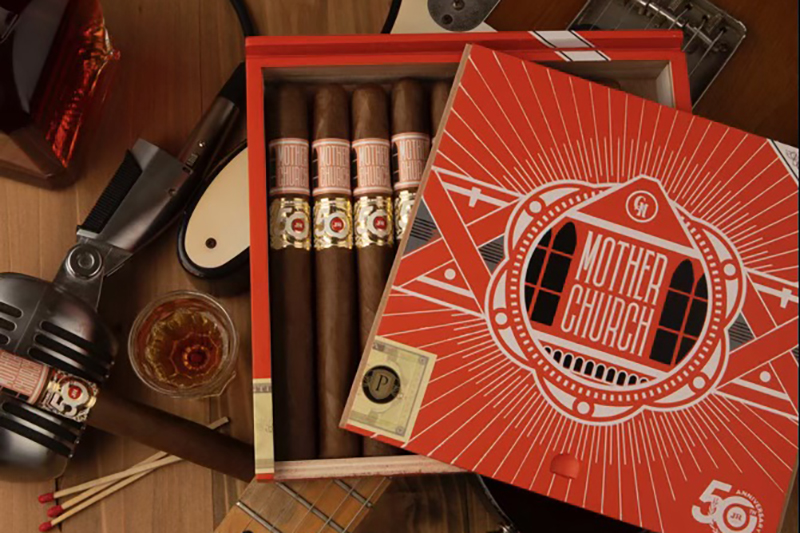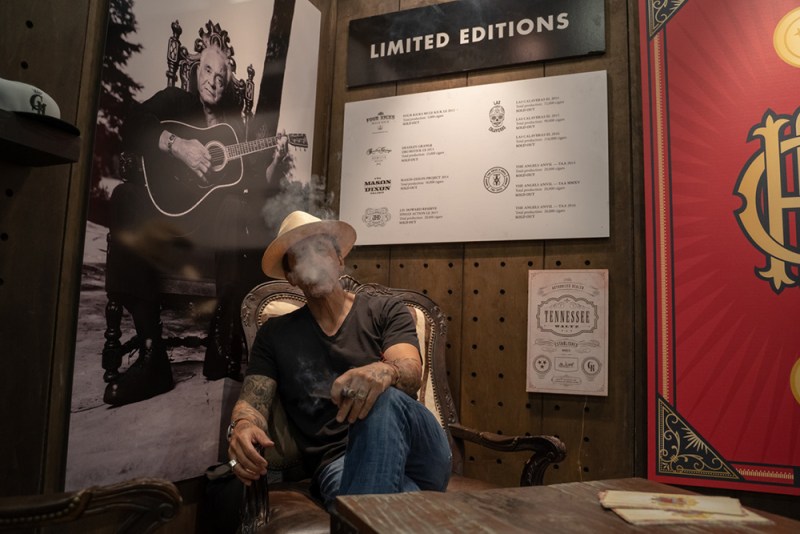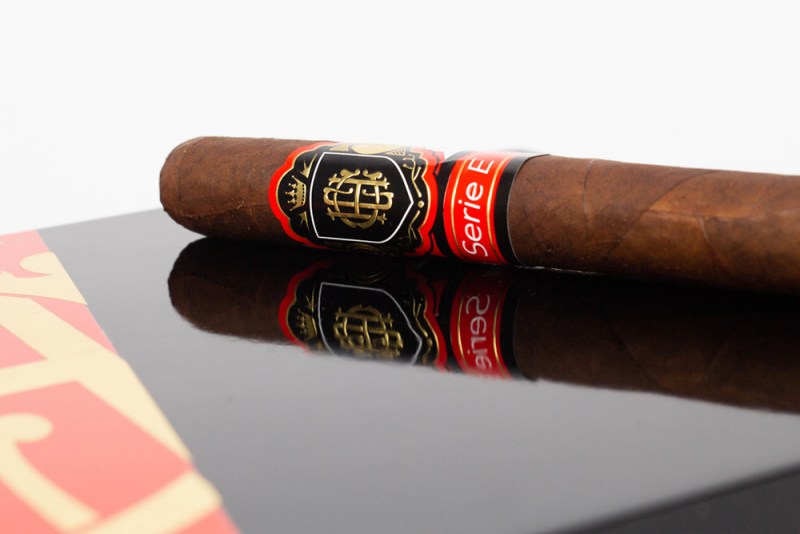
Nashville’s Crowned Heads cigar company hides in a sleepy warehouse district next door to a pet crematorium. “We’re kind of in the same business,” co-founder Jon Huber tells The Manual, laughing.
Lean and tan, with half- and full sleeves of tattoos peeking from under a modest white T-shirt, Huber doesn’t come off as the traditional cigar entrepreneur. He’s not: Born and raised in San Francisco until he was 17, he spent his 20s in Los Angeles working as a fitness professional and personal trainer at the celebrity-rich Sports Connection clubs. (Indeed, tucked back in the warehouse is a monk’s cell of workout equipment, including pullup bar, dumbbells and kettlebells, and a jump rope, which he’s used to great effect over the pandemic.) But despite his success, Huber grew tired of “toxic” L.A., and without much of a plan, he moved to Music City in the mid-1990s. “It wasn’t a matter of what I was gonna do. It was a matter of what I was not going to do,” he says. “I was not going to be in L.A. Here was a new start.”
Related Guides
How a man new in town, with no experience in tobacco and a degree in kinesiology, came to helm one of the most buzz-worthy small-batch cigar companies in the world is an unlikely story. And Huber knows it. “I know what having shitty jobs is like, so I appreciate every day that I get to do this,” he says. Temp jobs took up that first year. In between marketing calls for a diesel fuel reseller, he’d sneak off to the bathroom and sleep with his head against the stall door. “The most boring way to spend your time,” he says. “It was horrible.”
But there was one benefit: By discovering what he didn’t want to do, including selling Mr. Christal’s Australian Luxury Shampoo for Dogs via phone (a true story), Huber began to narrow down what he would do: something in the agricultural space, made by hand. Wine, maybe. When flying back to California to visit family, he’d travel to Wine Country vineyards, self-educating. “I had this romantic notion that you’re picking grapes, you’re stepping on grapes, you’re fermenting, you’re bottling,” he says. Instead, what he found was machines.
Searching for a gift for his father, the subsequent story has become popular lore among Nashville tobacconists: Huber stumbled in to the now-defunct Uptown Smoke Shop, which Forbes just so happened to rank as one of the top cigar shops in the world. “I went into the humidor, and I was like, oh my god, this is amazing,” he says. The smell of cedar and tobacco marrying. The humidity and earth. He learned while recording tasting notes in a small journal, pasting the bands of cigars next to each entry.

And while still working temp jobs, Huber began writing to cigar-makers who advertised in the back of Cigar Aficionado, the industry’s premier publication. No job too small, entry-level, mopping floors, whatever. He’d nearly given up by the time he reached the back of the mag and saw CAO, a cigar company founded by entrepreneur Cano Ozgener in Nashville in 1977. “I’m like, no way,” Huber says. That Ozgener was in the city at all was kismet, as the former DuPont engineer was transferred to the city in 1968 unrelated to his growing interest in cigars and simply stayed put when founding his new business. California expatriate Huber, who moved to the city on a whim, sent Ozgener, originally from Turkey, a gushing and desperate letter before retiring to the toilet for a nap.
You can guess what happens next: A garbled voicemail, a flash of realization, and Huber was talking his way into the position of shipping manager. “I said, ‘Yeah, I’ll be the best shipping manager you ever had,’” Huber says. “[Ozgener] always said I was the worst shipping manager ever.”
But Huber had established a toehold, and he only built from there. One morning, likely en route to his new job, he heard a local rock radio station promoting a contest, which included a pair of ringside seats for a boxing match and a box of cigars.
“It was like a lightbulb went on: ‘a box of cigars,’” he says. So he called the radio station, and when the marketing department admitted they were going to buy a random box of cigars, Huber made the audacious claim that he’d trade CAOs for ads. “And it was as easy as that,” he says. Moving from strength to strength (and unbeknownst to his employer), he pitched himself to the station as a cigar expert. Suddenly, one day a week and before his shift at the cigar company, he was fielding drive-time questions. He was no longer a lowly shipping manager working his first gig in an industry in which he had much to learn. “It’s Jon Huber with CAO International,” he says. After a handful of appearances and a stack of clips, he smacked them down on the desk of Ozgener. “He says, ‘You’re now the director of promotions and public relations,’” Huber says. “I’m like, ‘Let’s go.’”
For the next 14 years and with the full support of the late Ozgener, who passed away in 2018, Huber helmed the marketing side of CAO. Nothing was off the table. When Sopranos mania overwhelmed the U.S., Huber secured a placement, and the following year released a special-edition cigar with the HBO show.
View this post on Instagram
But CAO was sold to Swedish cigar maker Henri Wintermans in 2008, which itself was bought by Swedish Match, which also owned General Cigar, in 2010. Movers began appearing at CAO’s Nashville headquarters to measure the art on the walls, and the writing was on the wall. Huber, along with a select few CAO employees, received an offer to relocate to Virginia. The rest would be cut loose, the office closed.
“I didn’t even talk about money or compensation, anything. I’m just like, no,” he says. His future wife was in Nashville, and so was his son. Now that he’d found his purpose, he’d also found his place. “I just wanted to be loyal [to the city],” he continues. “I don’t know what I’m going to do, but I’m going to do something here.”
On December 17, 2010, the last day of CAO in Nashville, Huber gathered up his old press releases, magazine features, and assorted paraphernalia — the accumulation of more than a decade in the cigar industry — and threw them in the trash. “Complete cleansing,” he says. Four days later, he, with three other former CAO employees, met for the first time to form Crowned Heads.
While Crowned Heads may have risen from the ashes of CAO, it’s decidedly not what Huber calls “CAO 2.0.” Hand-rolled, as all quality cigars are, between four factories in Nicaragua and the Dominican Republic, all the company’s blends are selected by Huber and Co. with boots on the ground. Guided by Cigar Aficionado Hall of Fame member and master blender Ernesto Perez-Carrillo of EPC Cigar Co., Huber calls it his graduate studies in the industry. But he’s proven a fast learner.
Crowned Heads is, more than anything, playful, with its biggest influence the music that has contributed to Music City itself.
Walking into Crowned Heads’ HQ, you’re confronted by the famous 5-foot John Chiasson portrait of Johnny Cash, whose cover of Cocaine Blues inspired the name of Crowned Heads’ cigar Jericho Hill. (Jericho Hill was hometown of the sheriff who arrested the song’s protagonist and murderer.) The company’s debut, 2010’s Four Kicks, takes its name from a song of the same name by Nashville Southern rockers Kings of Leon, while Headley Grange (2012-13) was designed to create the smoking equivalent of the Led Zeppelin classic When the Levee Breaks, drawing its moniker from the English studio where the band recorded the track. (Frontman Robert Plant lived in East Nashville.) The Tennessee Waltz is both a real song and now a cigar homage to the state where Huber’s grandparents met and he wooed his wife. Even the cigar maker’s latest annual release, the Crowned Heads Courts Serie E, draws its inspiration (and letter) from the classic guitar solo Eruption by the late Eddie Van Halen. The inside of the box of Serie E cigars features the pattern of Van Halen’s famous striped guitar.

“Sonically, it’s almost like a metaphor for smoking a cigar,” Huber says of Serie E. “It starts off with a drum-and-bass intro — it’s like getting a cigar, cutting it, lighting it — and then all the triads and harmonics and arpeggios, it’s the complexity of the cigar. And at the very end, he ends it with that dive bomb. It’s like” — and Huber makes a noise like OOOOOOOOOVVVVVVVVV — “the exhalation, the lingering on your palate.”
While its annual releases are well-received, Crowned Heads has become almost better known for its ultra-limited-editions, and at the time of our interview, the company had dropped one a month since the start of the year. “It’s almost like in the music world,” Huber says. “We release an album at least once a year, and we do little single releases 12 times a year.”
Granted, whether you’re making 5,000 cigars or 500,000, the same care goes into each: the blend, the marketing, the packaging. Even the weather poses its own challenges, making some varieties of tobacco more or less rare, depending on the cropping season. “It’s a lot of coordination at the factory level, at the sales level, at the marketing level,” he says. “I love the creative process. It’s why I do it.”
Since its founding, Crowned Heads has only continued to grow, and with growth, Huber has only continued to dream. Most nights, he says, he wakes at 3 a.m., mind racing, and types notes in his phone. Some may turn into nothing, random word pairings that seem absurd when read after a cup of coffee. But others may become the next Four Kicks, which began as a kind of kiss-off to the corporate industry that ate his early years. At the helm of his boutique Crowned Heads’ ship and steering it into the future, Huber has found the purpose for which he’d spent so many of his early years searching.
“No Plan B,” he says. ““There’s no five-year, 10-year plan. I was going to ride the wave all the way to the shore. Whatever’s going to manifest for me is going to show itself.”



